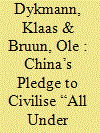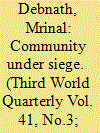| Srl | Item |
| 1 |
ID:
182950


|
|
|
|
|
| Summary/Abstract |
With China’s global rise, both its state leadership and key academics have engaged in developing a civilisational discourse for the twenty-first century partly based on ancient cosmological concepts. This article explores the meanings of and intentions behind this discourse, including its promise of a Chinese-led world order, and discusses its intended audience and international appeal. In the backdrop of theoretical debates on empires and their missions, the article claims that without a corresponding cultural appeal, China’s rising economic power and geostrategic clout are insufficient conditions to realise an empire in the classical sense. Growing inconsistencies mar the country’s imperial ambitions, such as those between a global civilising outreach and a toughening domestic embrace. Instead, imperial rhetoric is cautiously integrated in the party-state’s restoration of a Chinese “empire within,” indicating self-centredness and a lurking re-traditionalising of Chinese state power.
|
|
|
|
|
|
|
|
|
|
|
|
|
|
|
|
| 2 |
ID:
171213


|
|
|
|
|
| Summary/Abstract |
This article presents and analyses the voices and responses of the research participants about the impact of exclusionary formal and informal education policies imposed on the Santal community in Palashpur, Bangladesh (Palashpur is a pseudonym for the site of my research; it is also a metaphor for contested space where the colonial power and politics of the nation state exert domination and subordination). These policies are implemented through a state-led, centralised, monolingual and exclusionary curriculum in local primary and secondary schools, schools run by the churches, and schools supported by nongovernmental organisations. The education policies in Bangladesh bear the legacy of the combined forces of cultural homogenisation and social exclusion rooted in the colonial learning structure and its objectives. Embedded in these policies are elements of the civilising mission, an ultra-religious assimilative but exclusionary nationalistic agenda, and Western values of modernity and development. In this rural context, these alien ideologies and practices in education are actively engaged in eliminating local institutions, the knowledge system of indigenous peoples, the texture of their lives, their joy of living, their spirituality and their sense of being. This article reveals how, imposed from above, education policy and practices have dispersed an indigenous community to negotiate a life that goes against the interests of the community itself and its members.
|
|
|
|
|
|
|
|
|
|
|
|
|
|
|
|